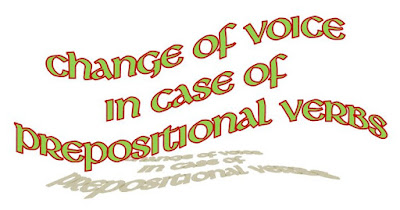Sometimes at the time of
changing Active voice into passive voice, subject does not follow ‘by’, rather
any of ‘at’, ‘in’, ‘with’, ‘to’… is used.
1. Affirmative:
a. Active voice : I
know her.
Passive voice : She
is known to me.
b. Active voice :
Your behaviour has surprised me.
Passive voice : I
have been surprised at your behaviour.
2. Negative:
a. Active voice :
His progress has not satisfied me.
Passive voice : I
have not been satisfied with his progress.
b. Active voice :
This jug does not contain hot milk.
Passive voice : Hot
milk is not contained in this jug.
3. Interrogative:
a. Active voice :
Can you please everyone?
Passive voice : Can
everyone be pleased with you?
b. Active voice :
What does this box contain?
Passive voice : What
is contained in this box?





















